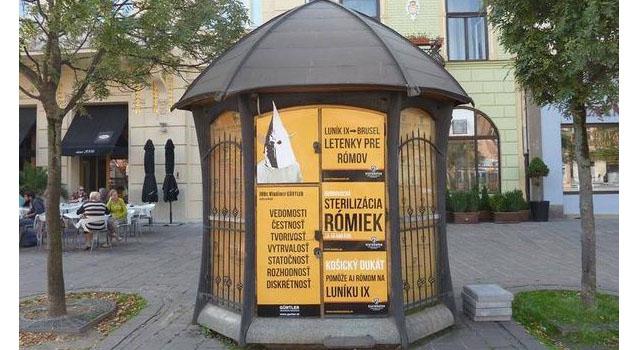Czech Government should have forced sterilization compensation plan outlined in six months

The Czech Government should receive a proposal for the outlines of a law to compensate the victims of illegal sterilizations by mid-2015. Money from the state would then be paid to the victims during the current administration, which is slated to leave office in 2017.
Czech Human Rights Minister Jiří Dienstbier (Czech Social Democratic Party – ČSSD) made the announcement today. The Czech Republic has been criticized over the forced sterilizations, mainly of Romani women, by the European Roma Rights Centre (ERRC) and the UN Human Rights Committee.
In 2009 the Czech cabinet apologized for the surgeries, which were performed without the free and informed consent of the women involved. A compensation model is being designed by a working group including representatives of several ministries, the Office of the Government and human rights defenders.
The outlines of the law should be ready by mid-2015. According to the Government’s original legislative plan, the explanatory memorandum for the law was supposed to have been developed by Sobotka’s cabinet by the end of this year.
The wording of the law should be drafted by the end of 2015. Victims could receive their compensation before the Sobotka administration leaves office.
"I am counting on it. However, it depends on the will of the Government, which I presume exists, as well as the will of both chambers of Parliament," Dienstbier said.
According to Dienstbier, it has yet to be decided what form the compensation would take and who would be entitled to it. "We want to set up a system that is fair and cannot be abused, and that requires detailed discussions," he said.
Romani women who were subjected to sterilization without their free and informed consent have been striving for compensation. Today 15 of them traveled to Prague to plead their case.
"We want to achieve compensation. We will continue to fight for it. For each of these women, this surgery was a violation of her body and soul," said Elena Gorolová of the Group of Women Harmed by Forced Sterilization.
Today the Romani women all stated that they basically had no idea what sort of surgery had been performed on them. They signed their consent to the operation under various forms of pressure.
Many of the women had also been told that the procedure was just temporary. "I was 23 years old. I had no idea what it even meant. Every woman should have the right to give birth to as many children as she wants," said forced sterilization survivor Marta Pušková.
Irena Faková, a resident of the Chanov housing estate in the town of Most, was forced to undergo sterilization 27 years ago. On the day she returned home from the hospital after giving birth, social workers paid her a visit.
The social workers threatened to take her children away unless she immediately returned to the hospital. "Only our [Romani] women were in the ward. They were having them sign papers. None of them knew what they were even signing," she said.
Upon returning home from hospital after the procedure, Faková then received CZK 5 000 from the state. Marek Szilvasi of the European Roma Rights Centre says the women were given not just money, but also, for example, washing machines.
"That is tangible evidence that the state had an interest in sterilizing a certain group. Five years after the public apology, however, it is still unclear what the Government’s position is on this human rights matter," Szilvasi said.
According to Szilvasi, several hundred women could be entitled to compensation. According to previous estimates by the Czech Government’s Committee against Torture, as many as 1 000 women could be entitled to compensation.
The minimum number of women who might receive compensation is 59. That is the number of cases delivered by the ombud to the Supreme State Prosecutor, who shelved them claiming a lack of evidence.
The Government Human Rights Council submitted its first motion to compensate the victims of forced sterilization in 2007. It sent a second motion at the start of 2012 to the cabinet of Prime Minister Petr Nečas (Civic Democratic Party – ODS).
Nečas did not review the motion before the collapse of his administration. According to the 2012 proposal, the victims were to be granted between CZK 300 000 and CZK 400 000 according to the personal injury claimed and the degree to which the legislation in force at the time had been violated.
Those entitled to compensation would include women subjected to forced sterilizations between 1972 and 1991. The surgeries were performed, under the regulations in place at the time, "in the interests of a healthy population", and authorities motivated women to undergo them by offering payments of up to CZK 10 000.
Women illegally sterilized after 1991 would also be entitled to compensation if they have not been able to seek compensation through the courts as a result of the three-year statute of limitations on such claims expiring. According to Kateřina Červená of the Liga lidských práv, who is a member of the Working Group, the forthcoming compensation would not just be paid to Romani women, but also to disabled women sterilized without their informed consent.
The amount paid to each woman should be the same, claims would be reviewed by a commission, and the victims would have to submit medical records documenting the sterilizations. The ERRC came forward in 2004 with suspicions that women, primarily Romani women, were being forcibly sterilized in the Czech Republic.
Dozens of women then applied to the ombud and some also turned to the courts for relief. The Czech Government Committee against Torture first proposed introducing compensation in 2006.
